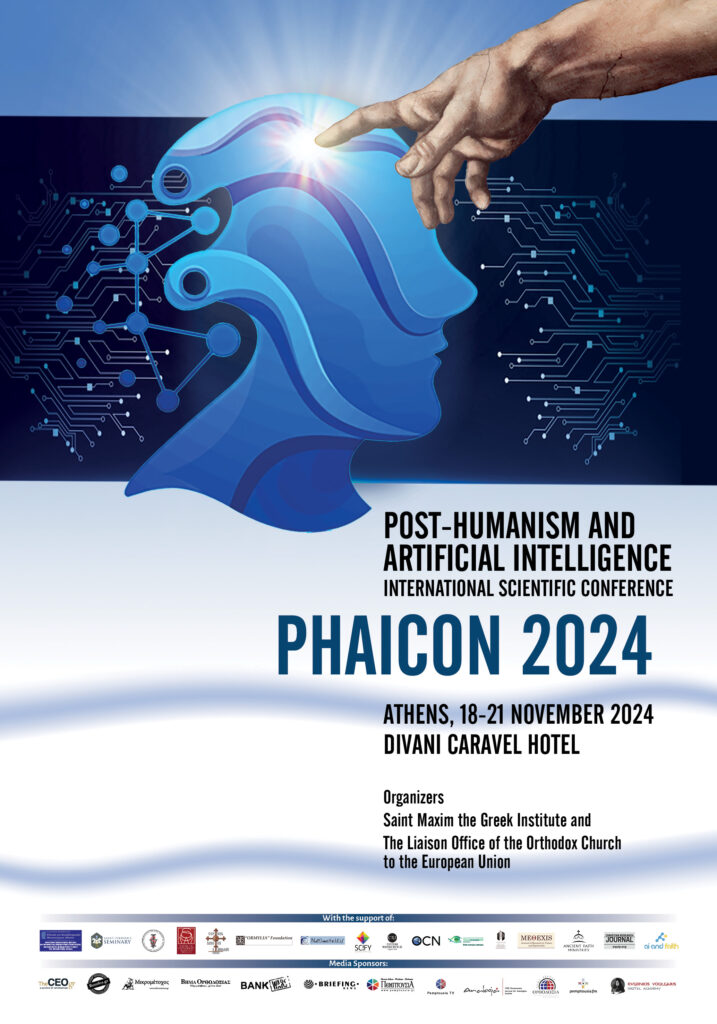The St. Maxim the Greek Institute, in collaboration with the Office of the Orthodox Church in the European Union, is organizing an International Scientific Conference titled POSTHUMANISM AND ARTIFICIAL INTELLIGENCE (PHAICON 2024), to be held at the Divani Caravel Hotel in Athens from November 18 to November 21, 2024. Τhe organizing committee of “PHAICON24 – The International Conference on Posthumanism and Artificial Intelligence” is excited to announce the official launch of the conference website www.phaicon.net
Watch Day 1 and 2 Replay In English (additional languages on YouTube):
Streaming & Attendance info below!
One hundred and fifteen experts will address, among other things, the scientific and socio-economic data and achievements of Artificial Intelligence, philosophical and theological perspectives, ethics and deontology, theories of transhumanism and posthumanism in relation to theology and philosophical thought, the anthropology of transhumanism and posthumanism, deconstructive rights-based thinking, and the woke culture, as well as the Orthodox anthropology and pastoral approach in relation to transhumanism, Artificial Intelligence, and human rights.
From the humanism of Modernity and the Enlightenment, there emerged great confidence in the power of human reason and the potential of the human spirit to determine not only the course of life but also its codes of values. However, what followed in the twentieth century did not confirm the anthropological optimism of modernity. Despite significant scientific achievements and social advancements, humanity emerged deeply scarred from two World Wars, from holocausts, genocides, ethnic cleansings, divisions, totalitarian regimes, and the Cold War.
![]()
Modern societies have recognized the need for science and ethics to progress together. However, ethics has been unable to keep pace with the rapid developments in biomedical technology, the digital ecosystem, cybernetics, and robotics, all of which create new realities for life and foster expectations that are increasingly viewed less as science fiction scenarios.
Artificial Intelligence, the latest achievement of scientific applications, has already taken over a large portion of daily life, serving human needs through the digital ecosystem and automation.
However, the prospect of it rising to levels where it connects with human nature and the human person raises significant questions in the fields of ethics, anthropology, science, philosophy, and theology.
The analyses by contemporary thinkers, who link Artificial Intelligence to the evolution of the human species, introduce new terms such as transhumanism and posthumanism. These terms have already been widely discussed in scientific, philosophical, and theological circles. Without a doubt, they will soon draw attention from political and legal spheres as well.
See the conference!
PHAICON24 brings together thought leaders, academics, and innovators from around the world to explore the transformative intersections of posthumanism and artificial intelligence. The event will feature a dynamic range of speeches.and.panel discussions both in-person and online.
- Program Details: A full agenda outlining session topics and timings.
- Speaker Information: Photos and sessions of all confirmed speakers.
Bilingual Interpretation: Greek-English interpretation will be available throughout the event, ensuring accessibility for both local and international participants.
Live Streaming: The entire conference will be streamed live on YouTube, providing global access to those who cannot attend in person. Videos are organized by day and room—check the program above for the location of each event.
In-Person Participation: For individuals wishing to attend in person, admission is free upon registration at the conference secretariat office located at the Divani Caravel Hotel, during the conference days.




0 Comments